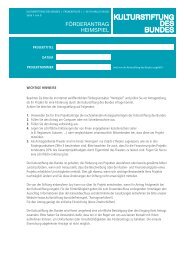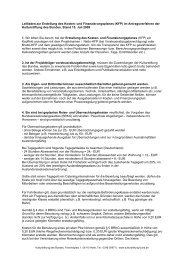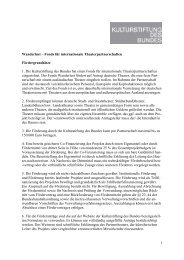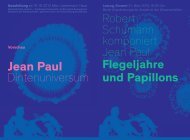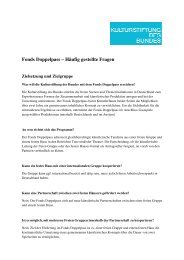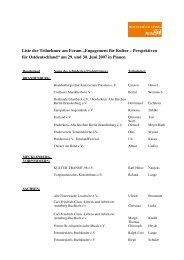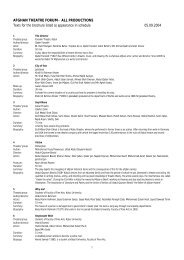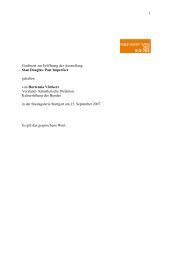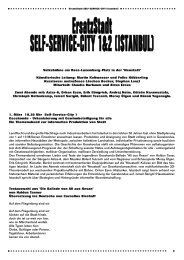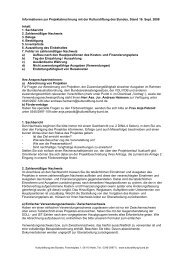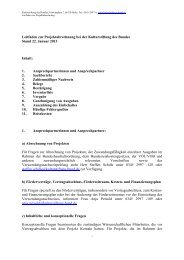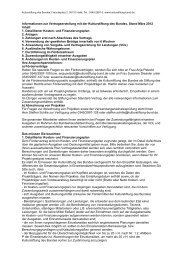CARACAS-CASE / and the culture of the informal city - Kulturstiftung ...
CARACAS-CASE / and the culture of the informal city - Kulturstiftung ...
CARACAS-CASE / and the culture of the informal city - Kulturstiftung ...
Create successful ePaper yourself
Turn your PDF publications into a flip-book with our unique Google optimized e-Paper software.
<strong>CARACAS</strong>-<strong>CASE</strong> / <strong>and</strong> <strong>the</strong> <strong>culture</strong> <strong>of</strong> <strong>the</strong> <strong>informal</strong> <strong>city</strong><br />
Interdisciplinary urban studies <strong>and</strong>/or interventions in Caracas, Venezuela<br />
(<strong>the</strong> country with highest segment <strong>of</strong> urban population (92%) (1) in Latin America)<br />
Point <strong>of</strong> departure<br />
In this international <strong>and</strong> interdisciplinary project <strong>the</strong> National Foundation for Art <strong>and</strong> Culture <strong>of</strong> <strong>the</strong><br />
Federal Republic <strong>of</strong> Germany is <strong>the</strong> sponsor <strong>of</strong> a research program <strong>of</strong> <strong>the</strong> Caracas Urban Think Tank<br />
that will give <strong>the</strong> impulse for concrete constructed urban interventions in <strong>the</strong> rhizome like growing<br />
Barrios (2) <strong>of</strong> Caracas.<br />
Caracas serves hereby as a prototypical Case study <strong>of</strong> <strong>the</strong> current critical situation <strong>of</strong> <strong>the</strong> Latin<br />
American Metropolis, <strong>and</strong> <strong>of</strong>fers in that respect a field for exploration whose results can be<br />
transferred to comparable situations in o<strong>the</strong>r countries <strong>of</strong> <strong>the</strong> region.<br />
The point <strong>of</strong> departure <strong>of</strong> this <strong>the</strong>sis is, that developments in <strong>the</strong> Hispano-American Metropolis depend<br />
today pr<strong>of</strong>oundly on <strong>informal</strong> influences. The effects are particularly in times <strong>of</strong> economic crises so<br />
strong that even parts <strong>of</strong> <strong>the</strong> formal <strong>city</strong> get caught in <strong>the</strong>ir wake. In <strong>the</strong> past Barrios have nei<strong>the</strong>r been<br />
registered in <strong>city</strong> maps nor has anybody seriously taken interest in <strong>the</strong>ir form, <strong>the</strong>ir improvised<br />
production methods <strong>and</strong> <strong>the</strong>ir <strong>culture</strong>.<br />
To break <strong>the</strong> taboo <strong>of</strong> <strong>the</strong> emerging <strong>informal</strong> <strong>city</strong> is for many in <strong>the</strong> public administrations impossible<br />
after <strong>the</strong>y ignored <strong>the</strong> situation for too long although <strong>the</strong>y had been aware <strong>of</strong> <strong>the</strong>ir presence.<br />
To confront <strong>the</strong> growing <strong>and</strong> present subject is <strong>the</strong>refore an international call to intervene when it is<br />
time to call <strong>the</strong> things by <strong>the</strong>ir name <strong>and</strong> to contribute to <strong>the</strong> <strong>city</strong> as <strong>the</strong> principal expression <strong>of</strong> our<br />
civilization.<br />
The economic thinking patterns are in many cases indifferent to <strong>the</strong> formal <strong>city</strong>. However, when<br />
developers <strong>and</strong> general contractors try to create with <strong>the</strong> cheapest materials housing developments,<br />
<strong>the</strong>y attempt to achieve a maximum pr<strong>of</strong>it. The rational planned suburban developments are<br />
uninhabitable <strong>and</strong> <strong>culture</strong> –less, in many cases even <strong>the</strong> inhabitants <strong>of</strong> <strong>the</strong> Barrios reject <strong>the</strong>m as<br />
stigmatizing.<br />
The Barrios are by no means perfect environments but in <strong>the</strong>ir totality <strong>the</strong>y presents itself today as a<br />
Barrio / Superstructure with a high degree <strong>of</strong> self organization.<br />
Mission <strong>and</strong> objectives<br />
In this international <strong>and</strong> interdisciplinary project a team <strong>of</strong> ten young committed specialists <strong>and</strong><br />
pr<strong>of</strong>essionals will have <strong>the</strong> opportunity to develop under <strong>the</strong> direction <strong>of</strong> <strong>the</strong> CCS-TT along with<br />
representatives <strong>of</strong> <strong>the</strong> Barrios <strong>and</strong> <strong>the</strong> municipality <strong>and</strong> in coordination with <strong>the</strong> <strong>city</strong> government<br />
<strong>the</strong>oretical <strong>and</strong> practical contributions to <strong>the</strong> development <strong>of</strong> <strong>the</strong> urban <strong>culture</strong> <strong>of</strong> Caracas.<br />
The processes <strong>and</strong> patterns <strong>of</strong> <strong>the</strong> creavtive dynamics inside <strong>the</strong> Barrios could deliver tangible<br />
suggestions to produce in <strong>the</strong> framework <strong>of</strong> <strong>the</strong> project with <strong>the</strong> National Foundation for Art <strong>and</strong><br />
Culture a „Retroactive building code“, which could pr<strong>of</strong>oundly change <strong>the</strong> vision in legislating future<br />
developments in all scales <strong>and</strong> have an effect for o<strong>the</strong>r Latin American cities, by sharing this<br />
experience <strong>and</strong> extending <strong>the</strong> sphere <strong>of</strong> influence to future planing strategies.<br />
The project attempts in it’s interdisciplinary approach to find an answer to <strong>the</strong> paradigm, how <strong>the</strong><br />
<strong>informal</strong> Latin American cities grow by destroying <strong>the</strong>ir traditional organisation-systems und how <strong>the</strong>y<br />
organize <strong>the</strong>mselves in an apparent chaos by means <strong>of</strong> <strong>informal</strong> interventions. Today’s question is, if<br />
<strong>the</strong>se improvised steadily growing cities are not <strong>the</strong> genuine presentation <strong>of</strong> urban <strong>culture</strong>, <strong>and</strong><br />
confront us with <strong>the</strong> emergence <strong>of</strong> a new estetic a new-vernacular.<br />
(1) Weltbank, CAMEBA Project 2001<br />
(2) Informelle Stadt, Armenviertel.<br />
Authors / Organisation<br />
The auto-organisation und production bypassing juristiction has resulted in an impressive democratic<br />
building which possibly presents a better answer to <strong>the</strong> urban problems tahn <strong>the</strong> <strong>of</strong>ficial strategies <strong>of</strong><br />
<strong>the</strong> <strong>city</strong> administartion where able to <strong>of</strong>fer. Traditional academic knowledge has to be left aside to
enter in a world which confronts us with practical built solutions to one <strong>of</strong> <strong>the</strong> big urban challenges,<br />
executed results that should no longer be ignored. To live in <strong>the</strong> same <strong>city</strong> no longer means to share<br />
<strong>the</strong> same urban environments.<br />
Executing body<br />
Caracas Urban Think Tank:<br />
Alfredo Brillenbourg, Caracas<br />
Hubert Klumpner, Caracas<br />
The responsible body for <strong>the</strong> conceptional <strong>and</strong> organisational production are:}<br />
in Venezuela :<br />
Caracas Urban Think Tank / CCS-TT, Directors; Alfredo Brillembourg <strong>and</strong> Hubert Klumpner, who<br />
work as architects <strong>and</strong> urban designers in Caracas in <strong>the</strong> CCS-TT <strong>and</strong> run a postgraduate course at<br />
<strong>the</strong> Universidad Central de Caracas <strong>and</strong> a design studio at <strong>the</strong> Universidad Simón Bolívar to <strong>the</strong> topic<br />
<strong>of</strong> <strong>the</strong> <strong>city</strong>.<br />
Possible Strategic Partners<br />
> Alcaldía Metropolitana, Caracas / Secretary for Urban development, Leopoldo Provenzali<br />
> Fundación Vollmer, Caracas / Director, Sophia Vollmer<br />
> La Farge, Cementos La Vega / President Venezuela, Angel Graterol<br />
> AMHABITAT / Director Federico Villanueva<br />
> Universidad Central de Venezuela, UCV / Dean, Azier Calvo<br />
> Harvard University, GSAD Monica Ponce de Leon<br />
Project components<br />
The Project includes a spectrum <strong>of</strong> different activities <strong>and</strong> is composed out <strong>of</strong> five components:<br />
1. Research-grants<br />
2. Urban Interventions<br />
3. Exhibition<br />
4. Publication<br />
5. International Interdisciplinary Seminar<br />
1. Research-grants:<br />
Research grants, specifically tailored for this project, will be made available to architects,<br />
urban designers, artists, anthropologists, geographers, economists, lawyers, photographers,<br />
web designers <strong>and</strong> writers.<br />
The objective is to activate in Caracas a working process – <strong>the</strong> engagement will reach from<br />
analysis to <strong>the</strong> design <strong>and</strong> <strong>the</strong> planning <strong>of</strong> projects, creation <strong>of</strong> Photo essays <strong>and</strong> <strong>the</strong><br />
production <strong>of</strong> texts.<br />
The research grant will be given for an period <strong>of</strong> 6 months. Participants will be selected by <strong>the</strong><br />
advisory board <strong>of</strong> <strong>the</strong> Project, which will be composed by partners from Berlin <strong>and</strong> Caracas<br />
<strong>and</strong> by representatives <strong>of</strong> <strong>the</strong> German National Fund for Art <strong>and</strong> Culture on <strong>the</strong> basis <strong>of</strong> <strong>the</strong>ir<br />
applications.<br />
2. Urban Interventions:<br />
(cultural <strong>and</strong> technical Infrastructures) in one or various Brrios <strong>of</strong> Caracas. Which are<br />
exemplary for <strong>the</strong> development <strong>of</strong> <strong>the</strong> Latin American Metropolis.<br />
3. Exhibition:<br />
The activities on <strong>the</strong> spot will be documented by <strong>the</strong> grantees <strong>and</strong> presented in <strong>the</strong>ir general<br />
cultural, social, <strong>and</strong> political context. The different results <strong>of</strong> <strong>the</strong> research <strong>and</strong> project<br />
development will be documented to form part <strong>of</strong> <strong>the</strong> exhibition. The development <strong>and</strong><br />
production <strong>of</strong> <strong>the</strong> Exhibition Concept will be from <strong>the</strong> initial phase part <strong>of</strong> <strong>the</strong> work <strong>of</strong> <strong>the</strong><br />
grantees.<br />
4. Publication:
Documentation with texts, images, essays etc. that best illustrates <strong>the</strong> results <strong>of</strong> <strong>the</strong> work <strong>of</strong><br />
<strong>the</strong> grantees.<br />
5. International Interdisciplinary Seminar:<br />
The seminar should contribute to install an international forum which is intended to create <strong>and</strong><br />
exchange a basis about <strong>the</strong> knowledge <strong>and</strong> <strong>the</strong> <strong>the</strong>ory about <strong>the</strong> Barrios. Situations could be<br />
discussed <strong>and</strong> possible scenarios could be developed.



